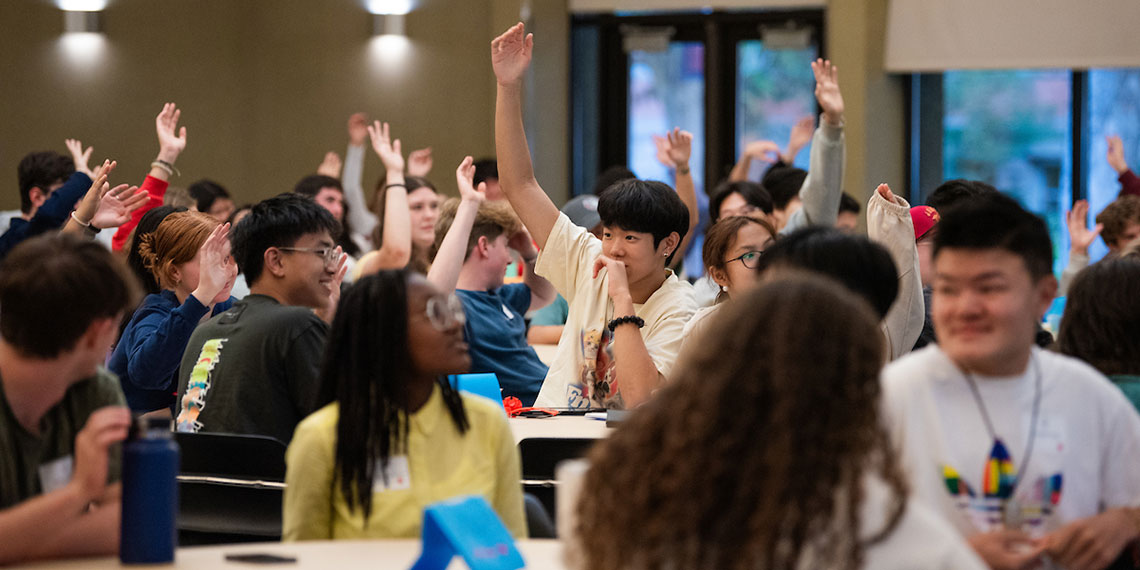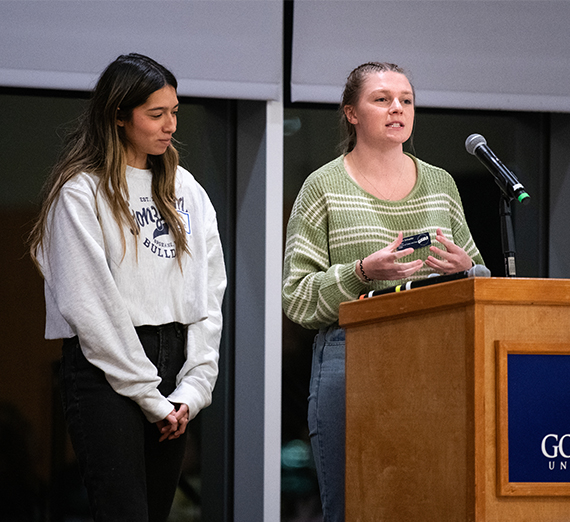GELAB 101: Forming Community Among International and American Students

Course Overview
Welcome to the Gonzaga Engagement Learning Lab (GELAB), Gonzaga’s newest initiative to increase cultural competency and form community among international and American students.
GELAB is the brainchild of Jeff Dodd, associate English professor interested in understanding how people form community and what happens when people feel outside of community. Dodd reached out to International Student and Scholar Services (ISSS) and the English Language Center (ELC), which had previously attempted a similar program through GSBA called International Peer Leaders that had mixed results and low recruitment.
Over the summer of 2023, staff from the Honors department, ISSS and ELC came together to develop what came to be known as GELAB, now in its inaugural year.
The program includes first-year honors students and international Intensive English Program or Pathway students. Honors students take a first-year seminar and international students take a Live, Learn, Grow (LLG) class, both of which have a GELAB component.
Claire Le Poullouin, assistant director of ISSS, states that GELAB “provides mutual learning opportunities for international and American students to learn from one another.” On the international side, students are further immersed into American culture, can practice English outside a classroom setting, and gain a greater sense of belonging on campus. Honors students can increase their intercultural competency and broaden their perspectives.
The program has seen growth despite initial challenges in group communication. Rosemary Colón, ELC transition coordinator and teacher of an LLG class, says, “GELAB is showing how a collaboration between programs can benefit all stakeholders and enrich the fabric of the Gonzaga community,” and provides visibility to international and multilingual students on campus.
Course Expectations
While the exact requirements and assignments differ for students in LLG classes versus honors classes, all participants are part of a cohort of five to six students (about two to three students from each class) and each cohort is expected to meet for a total of 20 hours over the fall semester.
Groups segment their 20 hours into three categories: community service, activities in the Spokane community and events on campus. Students keep track of their hours online with Community Engaged Learning (CEL) software. All these requirements are explained during GELAB orientation at the beginning of the semester, where honors students and international students get acquainted and participate in ice breakers.
International students are expected to keep a journal, documenting their experiences with pictures, reflections and responses to questions like “what aspects of your own culture did you share with your peers during the event or activity?”
Honors students write reflections on their GELAB experience, answering prompts like “how does day to day life function differently in different cultures?” and examine differences in topics like public spaces and food waste. Some honors students are also in a section of Honors 100 taught by both Dodd and Karen Petruska, associate director of Honors. In this class, everything talked about is applicable to the connections honors students are making with international students and requires further reflection from these honors students.
Student Feedback
Olivia Ferraro, a business major, is an honors student from Spokane. Her group met in the Welch basement to learn how to make dumplings from a fellow groupmate and talked about food culture. Ferraro, who has never traveled outside the U.S., says, “GELAB has helped me to open to my eyes to people I’ve never interacted with; it’s interesting to hear what it’s like outside the U.S. as it can be easy to get caught up in America.”
Andrew Putra, a sports management major from right outside of Jakarta, Indonesia, is an international student in LLG. His cohort typically gets boba or fro-yo near campus and has also volunteered at Logan Elementary. Putra previously attended college in Edmonds prior to coming to Gonzaga and points out differences in cultural understanding amongst members in GELAB. Some international students have a better understanding of American culture while others are quite new.
Maria Taggi, an applied math major with a concentration in biology, is an honors student from Cambrils, Spain. Taggi straddles the line between international and honors students. She mentions some of the cultural differences she experienced when she first started school, such as variations in eating time and the differences in vernacular English. “International students have a lot of pressure, some speak little English, and it can be difficult to explain their country’s poverty situation in a language that is not their own,” Taggi explains describing some of the conversations she has had in her GELAB cohort.
Ezra Wu, a biology major from Liuzhou, China, was not very comfortable in America at first due to differences in food and language. He spoke about people often nodding along to what he said rather than asking what he meant if they did not understand him. Wu wonders if this language barrier is the reason that many Americans do not spend time outside of class with international students. However, he thinks that GELAB is doing a good job of helping these two groups mix. His cohort has attended a variety of events on and off campus over the course of the semester: Logan Block Party, badminton club, the NCAA women’s soccer game and dinner at Frugals.
Future Courses
Program success will be measured in several ways: end-of-semester reflections, international student retention numbers, intercultural competency and a sense of campus belonging.
The future of and fundamental structure of GELAB will depend on program success, but all faculty members speak about potential changes to the program going forward, starting with making the credit hours more equitable. Currently, international students receive 1 credit while honors students receive 3-6 credits. Petruska speaks of potentially implementing the program with second semester first-year students versus first-semester students. Colón suggests more preparation time for both sets of students to help establish the community and set expectations before diving into cohort meet-ups. Students have discussed finding a way to make it easier for groups to meet and for the interactions to feel more natural.
Despite potential structural changes, the core of GELAB will remain the same: an attempt to improve the connection between international and domestic students, a connection that speaks to Gonzaga’s mission of supporting the whole person.
Ferraro and Taggi point to GELAB’s orientation where students heard that “American students can go through university without knowing any international students, but international students cannot go through university without knowing American students.” The importance of a program like GELAB at Gonzaga is that it helps to increase interaction between first-year international students and first-year American students, introducing both sides to cultures and experiences much different from their own. The goal is to strengthen Gonzaga’s community and make its students people for others.
- Academics
- Global Impact
- Diversity & Inclusion
- Student Life
- Center for Global Engagement




